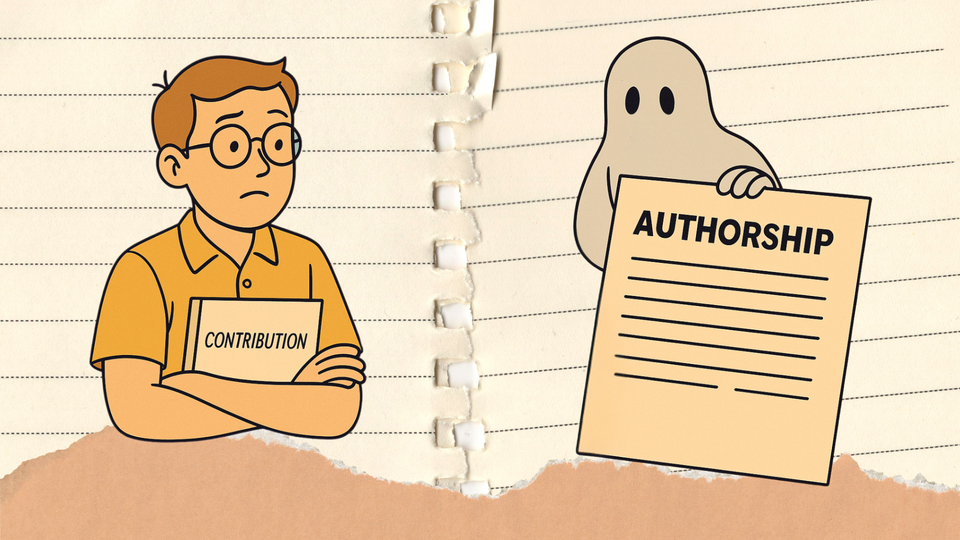The Ghost / Ghosted Authorship Dilemma

For my very first blog post on this platform, I got inspired by the name of the blog support system itself—Ghost. It made me reflect on a phenomenon that many early-career researchers quietly experience: ghost and ghosted authorship in scientific publications.
Let’s plot the scene: You’re a PhD student or a young postdoc, and your manuscript is finally ready for submission. Then comes the final author list—and you spot a name you’ve never even heard of. Confused, you trust your supervisor.
"They must know what they’re doing"
you tell yourself.
Years later, you might look back and realize that this name had no clear role in your work. The result? A pinch of well-deserved bitterness.
On the other side, it’s unfortunately too common to overlook the contributions of Master’s students, even when their work clearly merited co-authorship. This imbalance raises a key ethical question:
How do we determine who truly belongs on a paper? How can we make sure to avoid that bitter aftertaste later on?
1. Hierarchical Trust and Contribution Transparency
As young scientists, we often defer to our supervisors when it comes to decisions about authorship. But there’s a thin line between respect and blind trust. It’s perfectly valid—and necessary—to ask:
“What exactly did this person contribute to the paper?”
Supervisors should be open to this kind of dialogue. Sometimes the added author contributed during the early conceptual phase or helped secure funding, and that’s fair. But if you genuinely don’t recognize the name, it’s okay to ask for clarity—and to expect an honest answer.
Of course, cultural norms and hierarchical dynamics can make these conversations awkward. In many settings, seniority still takes precedence over transparency. But science, at its core, should be about accountability and fairness—not deference.
2. Dilution of Scientific Responsibility
Adding authors who had little to no involvement can blur the lines of accountability. In PhD-level work, where the first author has typically done the biggest part of the research (aka, the PhD him/her/themself), unknown or honorary authorships can shift the perception of responsibility in misleading ways.
What happens if there’s a methodological error, or a data irregularity, and someone assumes the mysterious co-author handled that part? Authorship should not be a way to offload responsibility—it should clarify who did what.
3. The Gifted (and Risky) Honorary Authorship
It’s no secret: in some labs, department heads or group leaders are routinely added as last authors, even if they had minimal or no involvement in the project. This is often justified with vague references to institutional tradition or lab culture.
For early-career researchers, challenging this can feel impossible. The fear of losing support, mentorship, or even funding makes it easier to stay quiet. But this practice not only undermines ethical authorship—it can also hurt your own credibility and dilute the impact of genuine contributors.
4. A Modest Proposal: Ethics Education from Day One
We won’t fix the problem overnight, but here’s a start:
- Track and document your contributions. Keep a personal log of your work and roles on every project. It’s your best defense when authorship is being negotiated.
- Ask early and clearly. If someone is being added to a paper and you’re not sure why, seek clarification respectfully—but firmly.
- Support visibility for junior contributors. Acknowledge your Master’s students and research assistants. Their careers can be transformed by one well-earned publication credit.
- Refer to the following frameworks to ensure fair credit and protect your academic integrity — and don’t wait to face unfair authorship to start questioning it:
- ICMJE Authorship Criteria – Understand who qualifies as an author.
- CRediT Taxonomy – Clearly define and communicate each contributor’s role.
- Publisher Authorship Guidelines – Follow standards from publishers like Springer or Elsevier to avoid unethical or honorary authorship.
A Final Word
Full disclaimer: I’ve been both valued and visible—and at other times, forgotten and erased. Trusting your colleagues and supervisors is essential, but unquestioning trust can hurt you in the long run.
So protect your voice, your work, and your future.
Take care of your authorship!

Comments ()